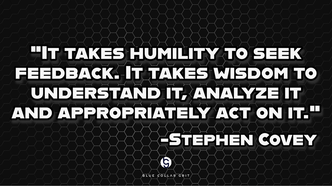Anonymous FeedbackBasketball season is just around the corner. As I prepare for the start of the season, there are numerous, very important items I have to be sure are taken care of in order for our season to get off to a clean start. As a high school coach you are the CEO of your program, but you’re also the secretary, custodian, and emergency contact.
Among all the tasks that must be completed, one of the most impactful for the development of our team is our practice evaluations. Each season I will invite several coaches, whom I respect, to evaluate and give me feedback on our players and our practice. These people rarely have basketball knowledge, so I often get asked how their opinions and feedback can help. It’s really pretty simple. The people I invite understand the process required to be excellent. That’s one of the best things about excellence, its habits apply to all fields. All of the feedback is useful, but maybe not in the exact way it’s meant or the package it’s delivered in. Why Should We Care? In the last fifteen years, we’ve probably had close to one hundred coaches in to watch and evaluate practice. Their feedback has provided our staff and players with phenomenal insights that we would’ve never recognized on our own. For example, a few personal areas I’ve grown in as a result of these evaluations are the tone of my feedback, where I’m physically standing while coaching in practice, the difference in detail I accept from different players, and lack of interaction between coaches during a session. I’m significantly better and our team has benefited equally from this, and many other, observer’s feedback. However, the changes weren’t immediate growth points - they began as pain points. The criticism of my tone when delivering feedback in practice was delivered as, “you sound pissed off all the time” when you are correcting someone. My initial, internal, response was something like, “yea, I am pissed - it’s the tenth time I’ve told him the same thing”. Though it wasn’t comfortable to hear, nor always true, the observation pushed me to reflect. There were numerous times in which I certainly did not intend to sound angry. I simply wanted to convey information and hope that the player was capable of doing what was expected of him. Fortunately, this feedback offered me an opportunity to move that from intent to reality. The same is true for the others noted above. Where I stand in practice was shared from an evaluator as “you look like you’re distancing yourself from the team”. In my reflection, this was accurate but it wasn’t intentional. There are certainly times in practice in which I feel like I need physical distance in order to see the big picture of our team play. But, I recognize that is not all the time. There are clearly times I need to be right in the mix with our guys - slapping fives, offering encouragement, and giving direction. This feedback simply brought awareness. Awareness that has allowed me to be more intentional with my daily actions and impactful with our team. Likewise regarding the lack of interaction with coaches during practice. The observer viewed this as a negative when he presented it to me. As we discussed it, I was reaffirmed with how we were spending our time in practice. Because our coaches were constantly interacting with the players, there was little time for them to engage with each other. Though, the feedback was perceived as a negative, it served to reinforce the actions we wanted modeled. Although I always know the coaches we invite to evaluate our practices and they write their names at the top of the assessment form, as far as we’re concerned the feedback is anonymous. The observations are what we are interested in - how are the behaviors being observed and interpreted by those outside ourselves and our team? From there, it’s our choice on how, or if, we want to use them. REAL TALK - Action Steps There is a popular clip on YouTube of Kobe Bryant talking about his belief that failure doesn’t exist. He points out that all the seeming failures we experience are really nothing more than data points for our next try. It’s only a failure if you quit trying. Feedback is very much the same way. Regardless of who gives it, feedback is simply data. Data to be used by you in whatever way you see fit. Once it’s delivered, it’s your job to process it. You are the one with the power to use or discard it. Here are a few ideas on maintaining this perspective and making the feedback you give and receive as useful as possible. Receiving
Giving
Feedback is critical to our growth and development. We are best served to treat it as anonymous, focusing solely on the data. All while recognizing that the choice of using, or not using, the feedback lies with one person: the receiver. For more information on building excellence in your teams, visit us at www.bluecollargrit.com. We would love to know how we could help!
1 Comment
Dan C
12/5/2023 09:50:13 am
I confession. I actually enjoy observing and learning from top coaches. That's one of the reasons why I love the BCG.
Reply
Leave a Reply. |
About bcI'm a teacher, coach, and parent seeking excellence while defining success on my own terms. Archives
July 2024
Categories |


 RSS Feed
RSS Feed